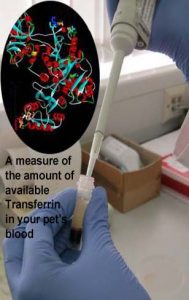Why Would My Dog Or Cat’s Total Blood Iron Binding Capacity Be Low Or High?
Ron Hines DVM PhD
The Total Iron Binding Capacity Of Your Pet’s Blood =TIBC
Total iron-binding capacity (TIBC) of your pet’s blood is an indirect way to measure its blood levels of transferrin. Transferrin is a blood protein that helps move iron from food or recycled (worn out) RBCs to locations where the iron is needed to manufacture hemoglobin for new red blood cells (hematopoiesis in your pet’s bone marrow). Transferrin is primarily made in your pet’s liver.
Reasons Your Pet’s Iron Binding Capacity Might be Increased:
Sudden liver failure (acute necrotic hepatitis = destruction) due to infection or toxins that cause a sudden release of its stored iron increase TIBC values. Increased TIBC can also occur when blood iron levels are abnormally high.
Reasons Your Pet’s Iron Binding Capacity Might Be Decreased:
Chronic Liver disease that decreases transferrin production or any inflammatory and chronic disease that
liberates “acute phase” proteins (e.g. C-reactive protein) and inflammatory cytokines can cause TIBC values to go down.
Misdirected blood circulation in your pet’s liver (e.g. portosysystemic shunts), severe malnutrition or starvation, kidney or intestinal diseases that cause the body’s blood albumen stores to leak into the urine or intestinal tract (chronic kidney failure, IBD, triad disease, etc.) can all decrease TIBC.
Complementary Tests :
CBC/ WBC and blood chemistry panel, urinalysis, C-reactive protein levels, secondary tests based on the findings of those initial tests
DxMe
